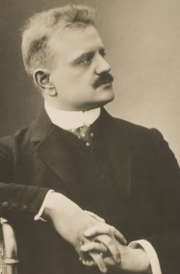| Six Songs, Op. 50 | |
|---|---|
| Song collection by Jean Sibelius | |
 The composer (c. 1905) | |
| Opus | 50 |
| Language | German |
| Composed | 1906 |
| External audio | |
|---|---|
| Sung by Anne Sofie von Otter, accompanied by Bengt Forsberg | |
The Six Songs, Op. 50,[a] is a collection of German-language art songs for vocal soloist and piano written in 1906 by the Finnish composer Jean Sibelius. "Die stille Stadt" ("The Silent City") generally is considered the best of the set.[1]
Constituent songs
Ordered by catalogue number, the Op. 36 songs are as follows:
- "Lenzgesang" ("Spring Song"), Op. 50/1; text by the German poet Arthur Fitger[2]
- "Sehnsucht" ("Longing"), Op. 50/2; text by the German poet Emil Rudolf Weiß[3]
- "Im Feld ein Mädchen singt" ("In the Field a Maid Sings"), Op. 50/3; text by the German-Jewish poet Margarete Susman[4]
- "Aus banger Brust" ("From Anxious Heart"), Op. 50/4; text by the German poet Richard Dehmel[5]
- "Die stille Stadt" ("The Silent City"), Op. 50/5; text by Dehmel[6]
- "Rosenlied" ("Song of the Roses"), Op. 50/6; text by the German poet Anna Ritter[7]
The songs were first published in 1907 by the Berlin-based firm of Robert Lienau.[8] The table below provides additional information about each song:
| Song | Tempo | Time | Key | Premiere | Ref. | |||
|---|---|---|---|---|---|---|---|---|
| Soloist | Pianist | Date | Venue | |||||
| No. 1 | Tempo giusto | — | — | — | — | |||
| No. 2 | Comodo | 6
8 |
Ida Ekman | Karl Ekman | 26 October 1906 | Solemnity Hall, Helsinki | ||
| No. 3 | Lento assai | |||||||
| No. 4 | Con moto | Maikki Järnefelt | Armas Järnefelt | 11 October 1906 | Finnish National Theatre | |||
| No. 5 | Andantino | |||||||
| No. 6 | Allegretto | 3
4 |
Ida Ekman | Karl Ekman | 26 October 1906 | Solemnity Hall, Helsinki | ||
Notes, references, and sources
Notes
- ^ Because Sibelius's Op. 50 songs are sung in German, this article gives preference to each song's native title, rather than the English translation.
References
- ^ Barnett 2007, pp. 177–178; Layton 1993, pp. 174–175.
- ^ Barnett 2007, p. 406; Dahlström 2003, p. 228.
- ^ Barnett 2007, p. 406; Dahlström 2003, p. 229.
- ^ Barnett 2007, p. 406; Dahlström 2003, pp. 230–231.
- ^ Barnett 2007, p. 406; Dahlström 2003, p. 231.
- ^ Barnett 2007, p. 406; Dahlström 2003, p. 232.
- ^ Barnett 2007, p. 406; Dahlström 2003, p. 233.
- ^ Dahlström 2003, pp. 228–233.
- ^ Dahlström 2003, p. 228.
- ^ Dahlström 2003, p. 229.
- ^ Dahlström 2003, p. 230.
- ^ Dahlström 2003, p. 231.
- ^ Dahlström 2003, p. 232.
- ^ Dahlström 2003, p. 233.
Sources
- Barnett, Andrew (2007). Sibelius. New Haven, Connecticut: Yale University Press. ISBN 978-0-300-16397-1.
- Dahlström, Fabian [in Swedish] (2003). Jean Sibelius: Thematisch-bibliographisches Verzeichnis seiner Werke [Jean Sibelius: A Thematic Bibliographic Index of His Works] (in German). Wiesbaden: Breitkopf & Härtel. ISBN 3-7651-0333-0.
- Layton, Robert (1993) [1965]. Sibelius. (The Master Musicians Series) (4th ed.). New York: Schirmer Books. ISBN 0028713222.
External links
- Six Songs, Op. 50: Scores at the International Music Score Library Project
